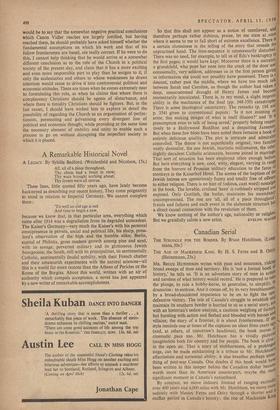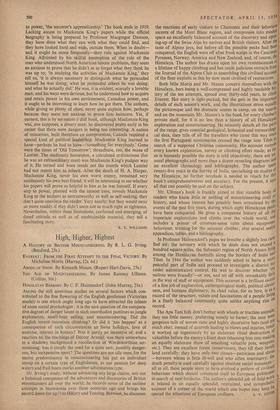Canadian Serial
THE AGE OF MACKENZIE KING. By H. S. Ferns and B. 001' (Heinemann, 25s.) MR. BRUCE HUTCFIISON writes with pace and assurance, risking broad sweeps of time and territory. His is 'not a formal book of history,' he tells us. 'It is an adventure story of men in action and careless of what history would record.' He is prepared to take the plunge, to ride a hobby-horse, to generalise, to simplify, t° dramatise: to enthuse. And it conies off, by its very breathlessness; by a broad-shouldered impatience to be on to fight the neat defensive victory. The tale of Canada's struggle to establish and I maintain its southern border is hurried to us as a serial story, not with an historian's sedate analysis, a cautious weighing of factors: but bursting with action and fleshed and blooded with heroes and villains; the story of a frontier, it is about frontiersmen. If the style reminds one at times of the captions on silent films years ug° (and, at others, of tomorrow's headlines), the book moves cinematic pace too. Mr. Hutchison has a vividly pictorial imagination both for country and for people. The book is alive: in the open air. That a story of stubbornness, of a prolonged siege, can be made exhilarating is a tribute to Mr. Hutchison 's affectionate and torrential ability; it also breathes perhaps sonic' thing of post-war Canada. One doubts if this book would have been written in this temper before the Canadian dollar beci most ti excitedly worth more than its American counterpart, maybe the significant moment in Canada's nationhood.
By contrast, we move indoors. Instead of ranging over 400 years and 4,000 miles with Mr. Hutchison, we move more sedately with Messrs. Ferns and Ostry through a shorter Wig .° stuffier period in Canada's history : the rise of Mackenzie King
to power, 'the sorcerer's apprenticeship.' The book ends in 1919. Lacking access to Mackenzie King's papers while the official biography is being prepared by Professor Macgregor Dawson, they have done what they can with what they could find, and they have looked hard and wide, outside them. When in doubt— and it might be more frequently—they rule against Mackenzie King. Affronted by his skilful assumption of the role of the man who understood North American labour problems, they seem so anxious to prove that he didn't as to forget what they think he was up to; 'in studying the activities of Mackenzie King,' they tell us, 'it is always necessary to distinguish what he persuaded
himself he was doing; what he persuaded others he was doing; and what he actually did.' He was, it is evident, scarcely a lovable man; and his ways were devious; but he understood how to acquire and retain power in his own environment, Canadian power, and it ought to be interesting to learn how he got there. The authors, while giving us plenty of clues, never quite explain how, perhaps because they seem too anxious to prove him insincere. Yet, if earnest, this is by no means a dull book, although Mackenzie King was; one supposes, a dreary man; he discovered pretty early in his career that there were dangers in bang too interesting. A nation of minorities, built therefore on compromises, Canada required a special kind of political leadership. Mackenzie King learned to have—perhaps he had to have—'something for everybody.' Gone were the times of 'Old Tomorrow'; threadbare, too, the maw of Laurier. The studiously homespun, a calculated ordinariness (for he was an extraordinary man) was Mackenzie King's pudgier way of it. He turned and wore inside out the mantle which Laurier had not meant him to inherit. After the death of H. A. Harper, Mackenzie King, never his own worst enemy, remained very assiduously his own best friend; it will be interesting to see whether his papers will prove as helpful to him as he was himself. If every step to power, planted with the utmost care, reveals Mackenzie King to the authors as untrustworthy as well as self-seeking, they don't quite convince the reader. Very nearly; but they would sway us more readily if they didn't seem not so much right as righteous. Nevertheless, within these limitations, confessed and emerging, of dated attitude as well as of unobtainable material, they tell a fascinating story.
E. T. WILLIAMS











































 Previous page
Previous page